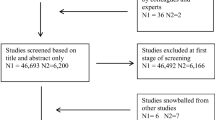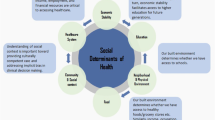Abstract
Prior studies on population health have reported an “immigrant health advantage” in which immigrants tend to show better health outcomes compared to their native-born racial/ethnic counterparts. Migrant selectivity and cultural buffering have been proposed as explanations for this relative advantage, predominantly in studies that focus on Latino immigrants’ health in the US. This study adds to the relatively scant literature on black immigrant health advantage by comparing the two hypotheses (migrant selectivity and cultural buffering) as related to black immigrant health. The effect of nativity on infant low birth weight is tested using data from the US Fragile Families and Child Wellbeing Study. Results indicate that immigrant black mothers do have relatively better health outcomes that may result from cultural buffering, which reduces their risky health behaviors.
Similar content being viewed by others
References
Overpeck MD, Moss AJ, Hoffman HJ, Hendershot GE. A comparison of the childhood health status of normal birth weight and low birth weight infants. Publ Health Rep. 1989;104:58–70.
McCormick MC, Gortmaker SL, Sobol AM. Very low birth weight children: behavior problems and school difficulty in a national sample. J Pediatr. 1990;117:687–93.
Boardman JD, Finch BK, Hummer RA. Race/ethnic differences in respiratory problems among a nationally-representative cohort of young children in the United States. Popul Res Policy Rev. 2001;20:1–20.
Lewitt EM, Baker LS, Corman H, Shionio PH. The direct costs of low birth weight. Future Child. 1995;5:35–51.
Almond D, Chay KY, Lee DS. The costs of low birth weight. Quart J Econ. 2005;120:1031–83.
Cervantes K. Wyshak: adverse birth outcomes among native born and immigrant women: replicating national evidence regarding Mexicans at the local level. Matern Child Health J. 1999;2:99–109.
Martin JA, Hamilton BE, Sutton PD, Ventura SJ: Births: Final Data for 2008. National Vital Statistics Report. 2010; 59(1).
Martin JA, Hamilton BE, Ventura SJ, Menacker F, Park MM: Births: Final Data for 2000. National Vital Statistics Reports. 2002; 52(10).
Hummer R, Powers D, Pullum S, Gossman G, Frisbie W. Paradox found (again): infant mortality among the Mexican-origin population in the United States. Demography. 2007;44:441–57.
Jasso G, Massey DS, Rosenzweig MR, Smith JP. Immigrant health, selectivity and acculturation. In: Anderson NB, Bulatao RA, Cohen B, editors. Critical perspectives on racial and ethnic differences in health in late life. Washington: National Academy Press; 2004. p. 227–66.
Palloni A, Arias E. Paradox lost: explaining the Hispanic adult mortality advantage. Demography. 2004;41(3):385–415.
Bender DE, Castro D. Explaining the birth weight paradox: latina immigrants’ perceptions of resilience and risk. J Immigr Health. 2000;2(3):155–73.
Sharma RD, Michalowski M, Verma RBP. Mortality differentials among immigrant populations in Canada. Int Migr. 1990;28(4):443–50.
Turra C, Elo I. The impact of salmon bias on the Hispanic mortality advantage: new evidence from Social Security data. Popul Res Policy Rev. 2008;27(5):515–30.
Feliciano C. Educational selectivity in U.S. immigration: how do immigrants compare to those left behind? Demography. 2005;42(1):131–52.
Abraido-Lanza AF, Dohrenwend BP, Ng-Mak DS, Turner JB. The Latino mortality paradox: a test of the “salmon bias” and healthy migrant hypotheses. Am J Public Health. 1999;89(10):1543–8.
Marmot MG, Adelstein AM, Bulusu L. Lessons from the study of immigrant mortality. Lancet. 1984;323(8392):1455–7.
Landale NS, Oropesa RS. Migration, social support and perinatal health: an origin-destination analysis of puerto rican women. J Health Soc Behav. 2001;42:166–83.
Scribner R, Dwyer JH. Acculturation and low birth weight among Latinos in the Hispanic HANES. Am J Public Health. 1989;79(9):1263–7.
Kent MM. Immigration and America’s black population. Popul Bull. 2007;62(4):1–16.
Singh GK, Siahpush M. All-cause and cause-specific mortality of immigrants and native borns in the United States. Am J Public Health. 2001;91(3):392–9.
Howard DL, Marshall SS, Jay S, Kaufman P, Savitz DA. Variation in low birth weight and preterm delivery among blacks in relation to ancestry and nativity: New York City, 1998–2002. Pediatrics. 2006;118:e1399–405.
Collins JW, Wu SY, David RJ. Differing intergenerational birth weights among the descendants of US-born and foreign-born Whites and African Americans in Illinois. Am J Epidemiol. 2002;155(3):210–6.
David RJ, Collins JW. Differing birth weight among infants of U.S.-born Blacks, African-born Blacks, and U.S.-born Whites. N Engl J Med. 1997;337(17):1209–14.
Elo IT, Culhane JF. Variations in health and health behaviors by nativity among pregnant Black women in Philadelphia. Am J Public Health. 2010;100(11):2185–92.
Cabral H, Fried LE, Levenson S, Amaro H, Zuckerman B. Foreign-born and U.S.-born Black women: differences in health behaviors and birth outcomes. Am J Public Health. 1990;80(1):70–2.
Wasse H, Holt VL, Daling JR. Pregnancy risk factors and birth outcomes in Washington State: a comparison of Ethiopian-born and US-born women. Am J Public Health. 1994;84(9):1505–7.
Reichman Nancy, Teitler Julien, Garfinkel Irwin, McLanahan Sara. Fragile families: sample and design. Child Youth Serv Rev. 2001;23(4/5):303–26.
Rubalcava LN, et al. The healthy migrant effect: new findings from the Mexican Family Life Survey. Am J Public Health. 2008;98(1):78–84 28 now 29.
Feliciano C. Educational selectivity in US immigration: how do immigrants compare to those left behind? Demography. 2005;42(1):131–52 29 now 30.
Hummer RA. Black-white differences in health and mortality: a review and conceptual model. Soc Quart. 1996;37:105–25.
Jones CP. Invited commentary: race, racism, and the practice of epidemiology. Am J Epidemiology. 2001;154:299–304.
Williams DR, Neighbors H. Racism, discrimination, and hypertension: evidence and needed research. Ethn Dis. 2001;11:800–16.
Kreiger N, Discrimination and health in social epidemiology. In: LF Berkman, I Kawachi (ed) Oxford University Press, Oxford; 2000, p. 36–75.
Williams DR. Racism and health: a research Agenda. Ethn Dis. 1996;6:1–6.
Author information
Authors and Affiliations
Corresponding author
Rights and permissions
About this article
Cite this article
Taylor, C.A.L., Sarathchandra, D. Migrant Selectivity or Cultural Buffering? Investigating the Black Immigrant Health Advantage in Low Birth Weight. J Immigrant Minority Health 18, 390–396 (2016). https://doi.org/10.1007/s10903-015-0194-0
Published:
Issue Date:
DOI: https://doi.org/10.1007/s10903-015-0194-0




